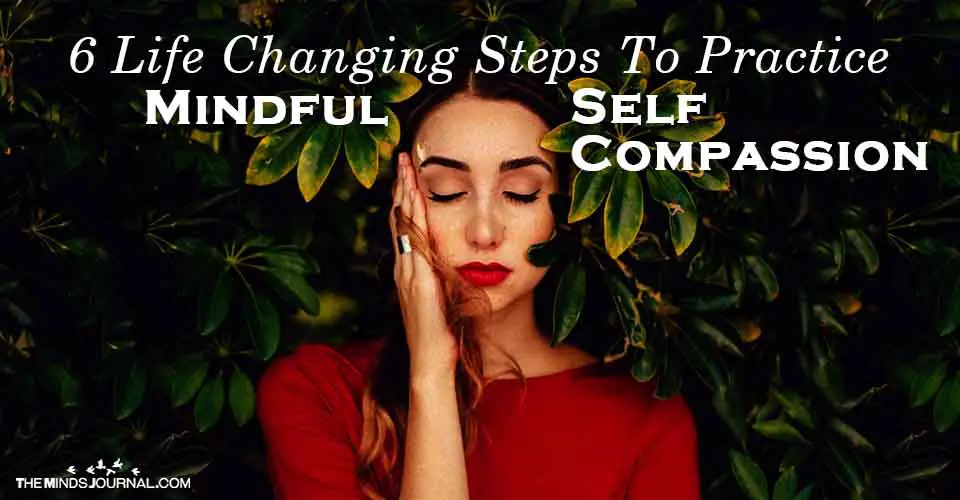How To Practice Mindful Self Compassion
Imagine you are in a theater watching a movie. It’s a suspense thriller. You have attached emotionally to the main character. You have seen the struggles the character has been through. You identify with her story. You are on the edge of your seat, waiting desperately to see how it all ends — to see the grand finale when everyone lives happily ever after.
When the movie ends, you know it is not real and that it never was. You are able to walk away, liberated from attachment to the movie.
The personal story of ‘me’ is much like a movie.
~ Scott Kiloby
Our lives are much like movies and we are the unknowing participants sitting in that theater. Throughout our days we become so involved in this movie that we forget that we’re just witnesses.
Memories, reenactments of past experiences, mental chatter, triggered emotions, beliefs, presumptions, judgments and future worries constantly play through our mind. And among all of this clutter, we cling to a story of us; of how bad, stupid, selfish, ugly, lost or messed up we are.
This constant stream within us is so subtle and elusive that we aren’t usually aware of it. Most of the time, this storyline stream is just below our consciousness, and because of that, we mindlessly carry out it’s bidding.
No wonder we feel so imbalanced, insecure, and depressed! We have become so automatically attached to this dramatic story of ourselves that we forget that we are the unchanging observer — the eternal consciousness — behind this volatile stream.
Related: 12 Tips To Self-Love And Compassion
Every story we have about ourselves has a beginning, a middle, and an end. And in our lives, we identify ourselves with multiple stories — sometimes destructive, sometimes lofty and majestic. But they are all stories just the same.
Sometimes we get so heavily invested in these volatile stories that we create habits of pain, self-hatred, and chaos in our lives. This is where the practice of mindful self-compassion comes in. And I want to teach you it today.
HOW TO PRACTICE MINDFUL SELF-COMPASSION
Mindful self-compassion is about learning how to be awake.
Being awake is about recognizing that you are not your inner volatile stream of thoughts, emotions, and sensations. Like clouds passing through the sky, these things come and go. But they are not you.
Whenever you have a judgmental or self-hating thought, it is actually possible to hold that thought in conscious awareness, allowing it to pass without believing it to be “you.”
But before you try to surrender these distressing feelings, you need to learn the practice of mindfulness.
Mindfulness is about becoming aware of the present moment, and it goes hand-in-hand with self-inquiry. Self-inquiry is the process of examining your inner story.
Related: How Mindfulness Can Improve Your Overall Mental Health
One of the best ways to start practicing mindful self-compassion is to dissect your self-beliefs. Why not take a moment now to inspect your story?
Ask yourself:
- What does it look like written down?
- When did it begin?
- What core beliefs does it involve (e.g. “I am unwanted,” “I am not good enough”)?
- What things trigger you to repeat this story in your head (e.g. being alone at night, fighting with your partner)?
- What “proof” is there that this story is real? Can you absolutely know that this proof is real?
- How does your story influence your actions?
- What would your life look like without this story?
Mindful self-compassion is an everyday practice that requires persistence and patience. Uprooting old, and sometimes deeply ingrained, habits of mind doesn’t just take a leisurely stroll in the park. So expect to put in time and effort. But if you persist with this practice, it could be the best decision you’ve ever made.
Watch out this video to know about the space between self-esteem and self-compassion.
Mindful self-compassion involves the following steps:
1. PRACTICE MINDFULNESS
Practice mindfulness every day. I recommend doing this through a meditation practice in the morning. This practice could be either a passive or active meditation. Start with 15 minutes, or if you can, ideally 45 minutes. When we really want something, we make time, even if life seems too busy. When there is a will, there is a way. If you struggle with mindfulness meditation at first, you might like to read up on the topic. Otherwise, here is some guidance:
- Sit in a comfortable position with your back straight. Think of your body as a majestic mountain. Then, settle into your breath. Notice the cold sensation as it comes in your nostrils, and warmth as it goes out of your mouth. You can also focus on external sounds or other physical parts of your body.
- Thoughts, sensations, memories, and feelings will arise and pull you away at first, but you must draw yourself back towards that breath, becoming aware of them. For the first few weeks or even months, this will be a difficult task. We are so used to becoming swept up in our mental chatter that it’s almost second-nature.
- You can use imagery to connect with that conscious, unmoving, eternal essence within you. I like to use the image of a large ravine, that I must voyage down into in order to find that still ocean at the bottom. Others like to consciously “take a step back” and adopt the role of an observer. Still, others like to “peel back” their thoughts to become acquainted with that stillness inside.
Related: How Communication Imagery Can Cement Your Relationship
- Continue mindfulness practice each day. Make adjustments as you see fit. Some practices may aid you while others may inhibit you, so experiment with what works for you.
2. NOTICE EXTERNAL TRIGGERS
If you want to practice mindful self-compassion, you have to become aware of the triggers that cause your story to automatically arise. For example, triggers I have discovered in my own life include shopping centers, certain scenes in TV shows, busyness, the night time, prolonged eye contact, and even social media sites like Facebook. The point here is to not avoid these triggers but to become aware of them. This will help you to become more conscious of any automated thoughts or feelings you have in the future.
Related: Healing Your Emotional Triggers: 5 Ways to Be Less Reactive
3. NOTICE UNCOMFORTABLE FEELINGS AND SENSATIONS
Another step towards mindful self-compassion is to become aware of the feelings associated with your story. These feelings are both emotional and also sensory-based. For example, common feelings in the body involve stiff muscles, clenched jaws, biting nails, hot flushes, chills, increased heartbeat, numbness, sweating, dizziness, etc. Common emotions involve shame, guilt, grief, anger, embarrassment, rejection, and anxiety. Becoming aware of your triggers takes a lot of practice. Often I uncover a string of triggers involved in my storylines.
4. FACE WHAT YOU ARE AVOIDING
Consciously allow yourself to feel the mental, emotional, and physical triggers that arise during your day. Notice your tendency to run away from them, dramatize them or distract yourself from them. Accept this tendency and show yourself compassion. Allow yourself to open up to whatever you feel. Notice how temporary the thought or feeling is. Allow it to pass in and out of consciousness.
5. BECOME YOUR OWN BEST FRIEND
Ask yourself, “How would I treat myself if I was my own best friend?” Reflect on the way you treat yourself when your story is dominating your mind. Are you cold-hearted, critical, and ruthless? Would you treat a friend like that? It’s OK, we’re all like that sometimes. Allow yourself to forgive these tendencies and replace them with gentleness, kindness, and tolerance — as you would with a good friend.
6. ACKNOWLEDGE THE SHARED HUMANITY
When your story takes hold, allow yourself to acknowledge the shared humanity of these feelings. You are not alone in your feelings — how could you be? And yet your story would convince you otherwise and keep you feeling isolated.
Related: The Problem With Faith: 11 Ways Religion Is Destroying Humanity
You can counteract this feeling of being alone in your suffering with a powerful phrase or mantra such as:
- This is a moment of suffering. I will let it pass.
- I unconditionally accept myself in this moment.
- May I be kind to myself right now?
***
Very few of us take the time to actively explore and observe our inner storylines. But when truly examined, our thoughts and feelings are seen for what they are: temporary, changeable and passing. They are not truly “us” no matter what we tell ourselves, or what others make us believe.
Mindful self-compassion is so dynamic because it combines two of the most powerful practices out there: mindfulness and self-love.
Have you practiced mindful self-compassion ever? How did you feel? Let us know in the comments.
Written by Aletheia Luna
Originally appeared on LonerWolf










Leave a Reply
You must be logged in to post a comment.